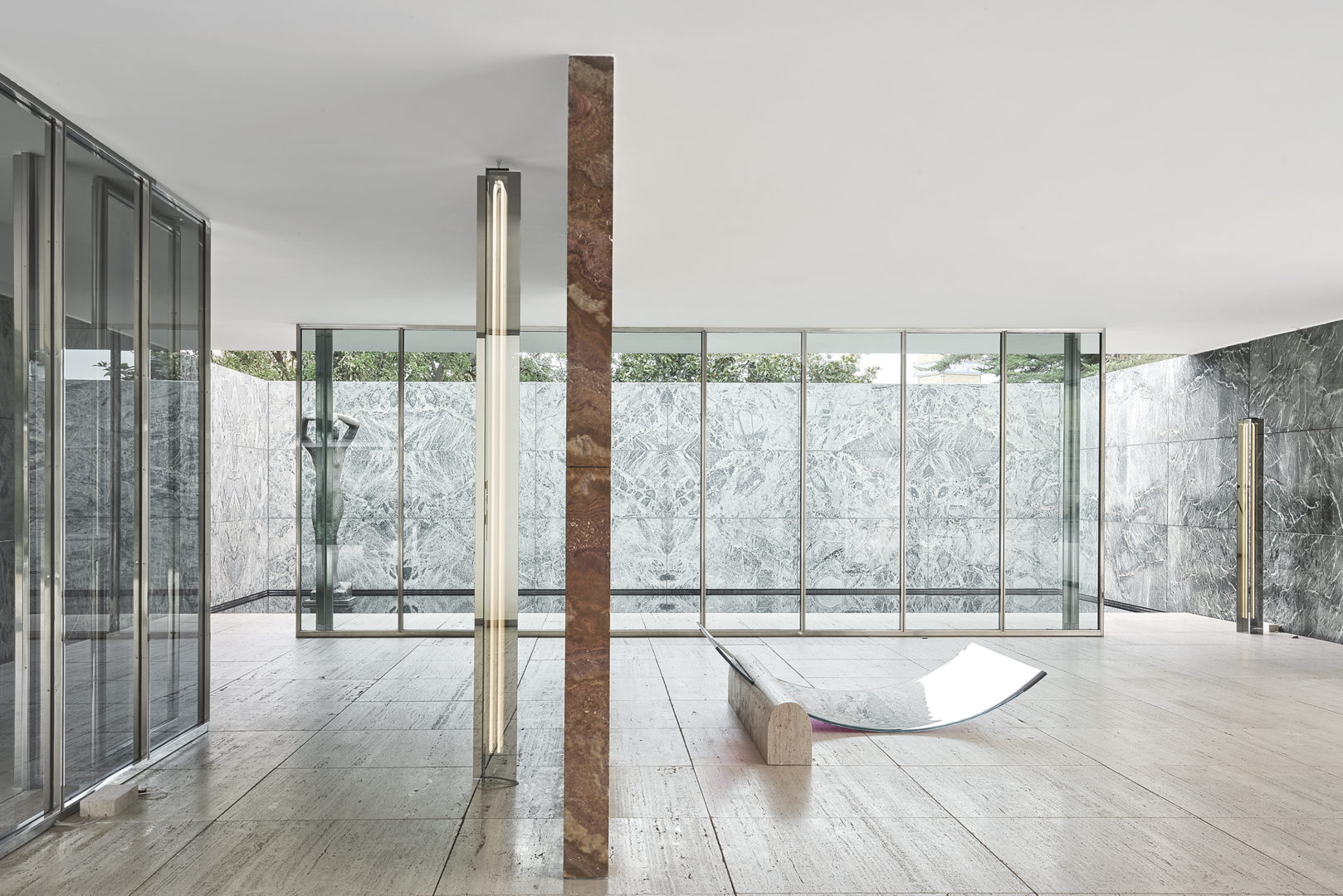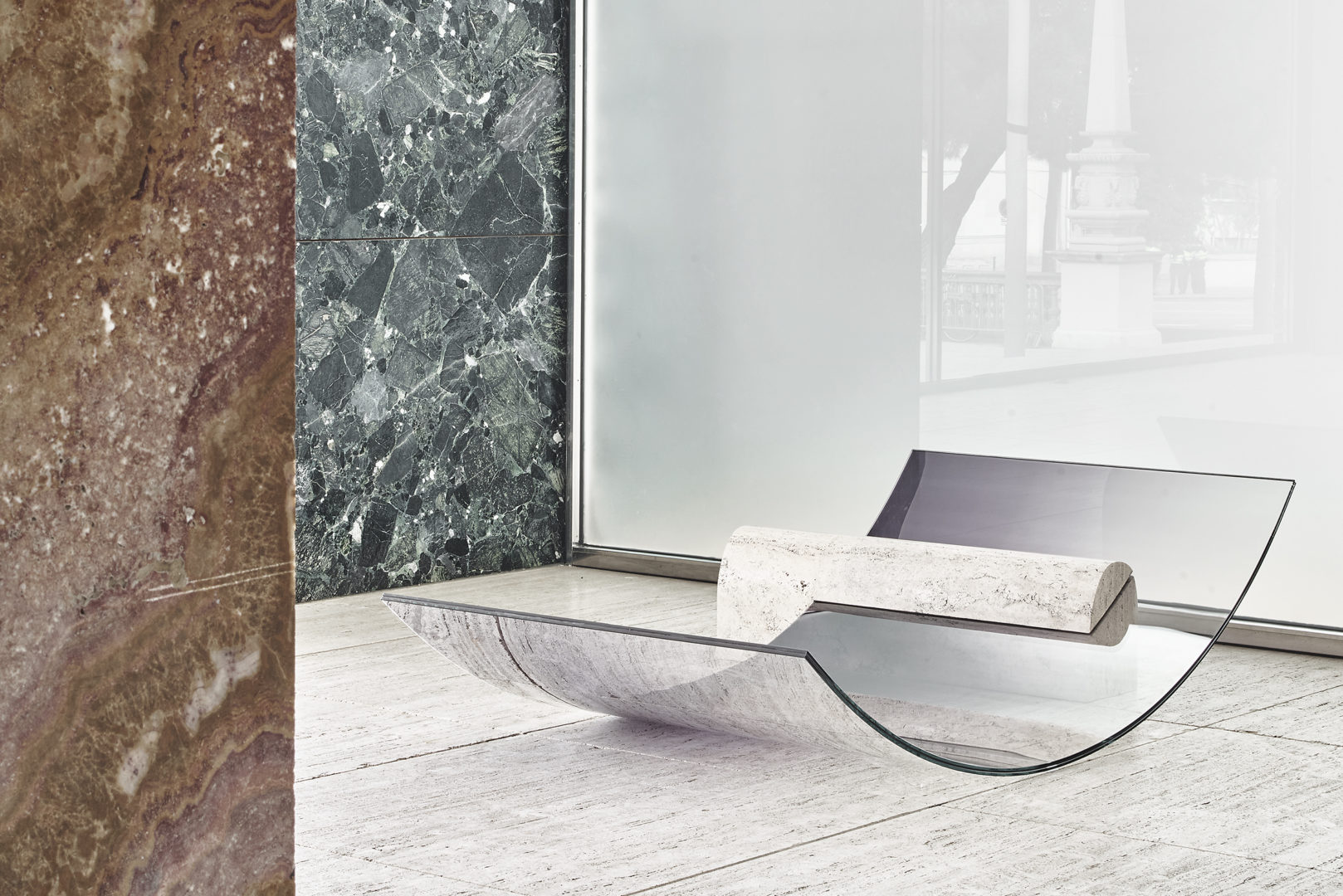No fear of glass by Sabine Marcelis
Side Gallery, Sabine Marcelis
![]()
![]()
![]()
![]()
![]()
![]()
![]()
![]()
![]()
![]()
No fear of glass by Sabine Marcelis
Side Gallery, Sabine Marcelis
BARCELONA
MIES VAN DER ROHE PAVILION
DEC 19 2019 - JAN 12 2019
Side Gallery and Sabine Marcelis in collaboration with the Fundació Mies van der Rohe held the exhibition “No Fear of Glass” in December 2019. The site-specific intervention took the title from ‘Fear of glass’, the book about the Barcelona Pavilion by Josep Quetglas, the proposal aimed to explore the contrast between the request made to Mies van der Rohe to “not use too much glass” with the creative proposal of Sabine Marcelis herself, where glass was the key element of the exhibition, pushing the material’s limits to the end.
Mies Van de Rohe and Lilly Reich experimented with materials to test their ideals of modernity through the rigour of their geometry, the precision of their pieces and the clarity of their assembly. Marcelis alike used material and production experimentation to create surprising applications, perfect in form, that translate the materiality and profile of the Pavilion.
The five original works proposed by Marcelis’ confronted Van der Rohe ́s Masterpiece with tenacious perception; two chaise lounges, one wide the other narrow were composed by a slice of layered curved glass seemingly extracted from the onyx wall, which appeared to float above the ground, as the base was perceived as a continuation of the Roman travertine floor, which swelled up and intersected with the glass doubling as a neck rest to provide comfort and complete the form of a chaise lounge .The material and structural sensibility of the chaise lounges were a perspicuous reflection of the designer’s desire synthesize the pavilion’s modern architecture and functional design. The pieces were carefully ergonomically considered as well as taking their scale from the pavilion. As a result of these conditions the objects paralleled the capacious scale of the pavilion, yet within this larger than human scale, the sharp design details forged by Marcelis, such as the shape of the neck-rest and the exact radius of the curved glass permitted practicality.
A further structural extrusion devised by Sabine was the introduction of two mirrored-glass columns which functioned as a floor lamps. The Tall Pillar Light is boldly but respectfully placed in line with the eight chrome columns that provided the structural support to the roof of the Pavilion. The Tall Pillar Light was directly proportional to the structural columns, being deconstructed to create a void to house a neon light. When switched off the creation appeared chrome, evoking the illusion of a ninth column, but when switched on its materiality becomes transparent revealing the true medium; a two-way mirror, creating a myriad of reflections. The second Pillar Light was smaller, designed as a singular element, introducing a human scale to the vastity of the emblematic building.
Marceils's does not limit herself to the hard elements of the celebrated construction, she also considers the natural elements of the Pavilion ́s design. Subjectively, the most beautiful, objectively the most remarkable piece of the intervention is placed in the water pond outside; a curved glass fountain constituting of two sheets of layered colored glass, polished aluminum, water and pumps. A perfect reflection of Sabine ́s desire to create magical moments within materiality, the water extrudes from the pond and flows upwards between the layers of laminated glass following the contours of the sculpture and spilling from edges back down into the pond. True to her ideology, the sculpted curvature protracted the material to its absolute maximum angle within such proportions.
(Text: side-gallery.com)










Mies Van de Rohe and Lilly Reich experimented with materials to test their ideals of modernity through the rigour of their geometry, the precision of their pieces and the clarity of their assembly. Marcelis alike used material and production experimentation to create surprising applications, perfect in form, that translate the materiality and profile of the Pavilion.
The five original works proposed by Marcelis’ confronted Van der Rohe ́s Masterpiece with tenacious perception; two chaise lounges, one wide the other narrow were composed by a slice of layered curved glass seemingly extracted from the onyx wall, which appeared to float above the ground, as the base was perceived as a continuation of the Roman travertine floor, which swelled up and intersected with the glass doubling as a neck rest to provide comfort and complete the form of a chaise lounge .The material and structural sensibility of the chaise lounges were a perspicuous reflection of the designer’s desire synthesize the pavilion’s modern architecture and functional design. The pieces were carefully ergonomically considered as well as taking their scale from the pavilion. As a result of these conditions the objects paralleled the capacious scale of the pavilion, yet within this larger than human scale, the sharp design details forged by Marcelis, such as the shape of the neck-rest and the exact radius of the curved glass permitted practicality.
A further structural extrusion devised by Sabine was the introduction of two mirrored-glass columns which functioned as a floor lamps. The Tall Pillar Light is boldly but respectfully placed in line with the eight chrome columns that provided the structural support to the roof of the Pavilion. The Tall Pillar Light was directly proportional to the structural columns, being deconstructed to create a void to house a neon light. When switched off the creation appeared chrome, evoking the illusion of a ninth column, but when switched on its materiality becomes transparent revealing the true medium; a two-way mirror, creating a myriad of reflections. The second Pillar Light was smaller, designed as a singular element, introducing a human scale to the vastity of the emblematic building.
Marceils's does not limit herself to the hard elements of the celebrated construction, she also considers the natural elements of the Pavilion ́s design. Subjectively, the most beautiful, objectively the most remarkable piece of the intervention is placed in the water pond outside; a curved glass fountain constituting of two sheets of layered colored glass, polished aluminum, water and pumps. A perfect reflection of Sabine ́s desire to create magical moments within materiality, the water extrudes from the pond and flows upwards between the layers of laminated glass following the contours of the sculpture and spilling from edges back down into the pond. True to her ideology, the sculpted curvature protracted the material to its absolute maximum angle within such proportions.
Sabine Marcelis
sabinemarcelis.com
Side Gallery
side-gallery.com
(Related Projects)